Lithium Batteries: The Future of Energy Storage
In recent years, the demand for energy storage has increased significantly as more people are turning to renewable energy sources like solar and wind power. The key to reliable and efficient energy storage lies in the development of high-performance batteries. Among the different types of batteries available in the market, lithium-ion batteries have emerged as the most promising technology for energy storage.
Lithium-ion batteries are rechargeable batteries that use lithium ions as a key component in the process of energy storage and release. These batteries have several advantages over traditional lead-acid batteries and other conventional battery technologies. For starters, they have a higher energy density, which means they can store more energy in a smaller package. They also have a longer lifespan and can be recharged several times before they need to be replaced.
The use of lithium-ion batteries in portable electronic devices like smartphones and laptops has become mainstream in recent years. However, their potential for energy storage on a larger scale is still being explored. With the growing demand for renewable energy sources, the development of efficient and reliable energy storage systems based on lithium-ion batteries has become a key research area.
One of the most significant advantages of lithium-ion batteries is their ability to store energy from intermittent sources like solar and wind power. These energy sources are unpredictable and can vary in intensity, making it difficult to rely on them as a primary source of energy. However, with the use of lithium-ion batteries, excess energy generated during peak hours can be stored and used during periods of low energy production.
Another advantage of lithium-ion batteries is their scalability. Lithium-ion batteries can be scaled up or down depending on the energy storage requirements. This means they can be used for small-scale applications like powering homes or large-scale applications like providing backup power for entire cities.
The adoption of lithium-ion batteries in the transportation sector is also on the rise. Electric vehicles (EVs) are becoming increasingly popular as people look for more environmentally friendly alternatives to traditional gasoline-powered cars. Lithium-ion batteries are the most commonly used type of battery in EVs due to their high energy density and reliability.
There are, however, some challenges associated with the use of lithium-ion batteries for energy storage. One of the main issues is the high cost of production. Lithium-ion batteries use rare and expensive materials like cobalt and lithium, which drive up the cost of production. However, with advancements in technology, the cost of lithium-ion batteries is expected to decline in the future.

Another challenge is the environmental impact of lithium-ion batteries. The mining and production of lithium and other materials used in these batteries can have negative environmental consequences. However, there are efforts underway to develop more sustainable methods of production and recycling of these materials.
In conclusion, lithium-ion batteries are the future of energy storage. With their high energy density, scalability, and ability to store energy from intermittent sources, they offer a reliable and efficient solution to the challenges of renewable energy storage. While there are still some challenges that need to be addressed, the continued research and development of lithium-ion batteries will pave the way for a more sustainable energy future.
-
 Lithium batteries have become increasingly popular in recent years due to their high energy density, long lifespan, and relatively low self-discharge rate. However, like any technology, they also have their limitations and drawbacks. In this article, we will explore the advantages and limitations of lithium batteries. Advantages of Lithium Batteries 1. High Energy Density: Lithium batteries have a high...Read more
Lithium batteries have become increasingly popular in recent years due to their high energy density, long lifespan, and relatively low self-discharge rate. However, like any technology, they also have their limitations and drawbacks. In this article, we will explore the advantages and limitations of lithium batteries. Advantages of Lithium Batteries 1. High Energy Density: Lithium batteries have a high...Read more -
 Introduction: In recent years, the agricultural sector has witnessed a significant revolution in terms of technological advancements. One such revolution has been the development and use of high-power lithium batteries. These batteries have transformed the way agricultural tools and equipment function, providing farmers with greater efficiency, productivity, and sustainability. This article aims to explore the impact of high-power lithium...Read more
Introduction: In recent years, the agricultural sector has witnessed a significant revolution in terms of technological advancements. One such revolution has been the development and use of high-power lithium batteries. These batteries have transformed the way agricultural tools and equipment function, providing farmers with greater efficiency, productivity, and sustainability. This article aims to explore the impact of high-power lithium...Read more -
 Maintaining your car starter battery is crucial to ensure that your vehicle starts and runs smoothly. The battery is responsible for providing the necessary power to start the engine, and if it fails, you could be stranded with a car that won start. Here are some key tips for maintaining your car starter battery: 1. Keep the battery clean:...Read more
Maintaining your car starter battery is crucial to ensure that your vehicle starts and runs smoothly. The battery is responsible for providing the necessary power to start the engine, and if it fails, you could be stranded with a car that won start. Here are some key tips for maintaining your car starter battery: 1. Keep the battery clean:...Read more -
 With the increasing demand for clean and sustainable energy solutions, lithium batteries have gained significant popularity in recent years. Among the various types of lithium batteries available in the market, the 100Ah Lithium Iron Phosphate (LiFePO4) battery stands out for its long-lasting power and numerous benefits. In this article, we will delve into the features and advantages of the 100Ah...Read more
With the increasing demand for clean and sustainable energy solutions, lithium batteries have gained significant popularity in recent years. Among the various types of lithium batteries available in the market, the 100Ah Lithium Iron Phosphate (LiFePO4) battery stands out for its long-lasting power and numerous benefits. In this article, we will delve into the features and advantages of the 100Ah...Read more -
 Introduction LiFePO4 batteries have gained immense popularity over the years due to their advanced features and benefits. These batteries are known for their high efficiency, long-lasting power, and excellent performance. They are ideal for various applications, including electric vehicles, solar energy storage, and portable power supplies. In this article, we will discuss in detail the benefits of using 12V LiFePO4...Read more
Introduction LiFePO4 batteries have gained immense popularity over the years due to their advanced features and benefits. These batteries are known for their high efficiency, long-lasting power, and excellent performance. They are ideal for various applications, including electric vehicles, solar energy storage, and portable power supplies. In this article, we will discuss in detail the benefits of using 12V LiFePO4...Read more -
 Lithium-ion batteries have taken the world by storm, and for good reason. They are highly efficient, have a long lifespan, and can pack a lot of power in a small package. One of the most popular types of lithium-ion batteries is the LiFePO4 battery. This type of battery is incredibly popular in a variety of applications because of its long...Read more
Lithium-ion batteries have taken the world by storm, and for good reason. They are highly efficient, have a long lifespan, and can pack a lot of power in a small package. One of the most popular types of lithium-ion batteries is the LiFePO4 battery. This type of battery is incredibly popular in a variety of applications because of its long...Read more -
 The growing demand for clean and renewable energy sources, coupled with the increasing need for efficient and reliable energy storage solutions, has led to the development of advanced battery technologies. One such technology is the lithium iron phosphate (LiFePO4) battery. LiFePO4 batteries are a type of rechargeable lithium-ion battery that use lithium iron phosphate as the cathode material. They...Read more
The growing demand for clean and renewable energy sources, coupled with the increasing need for efficient and reliable energy storage solutions, has led to the development of advanced battery technologies. One such technology is the lithium iron phosphate (LiFePO4) battery. LiFePO4 batteries are a type of rechargeable lithium-ion battery that use lithium iron phosphate as the cathode material. They...Read more

